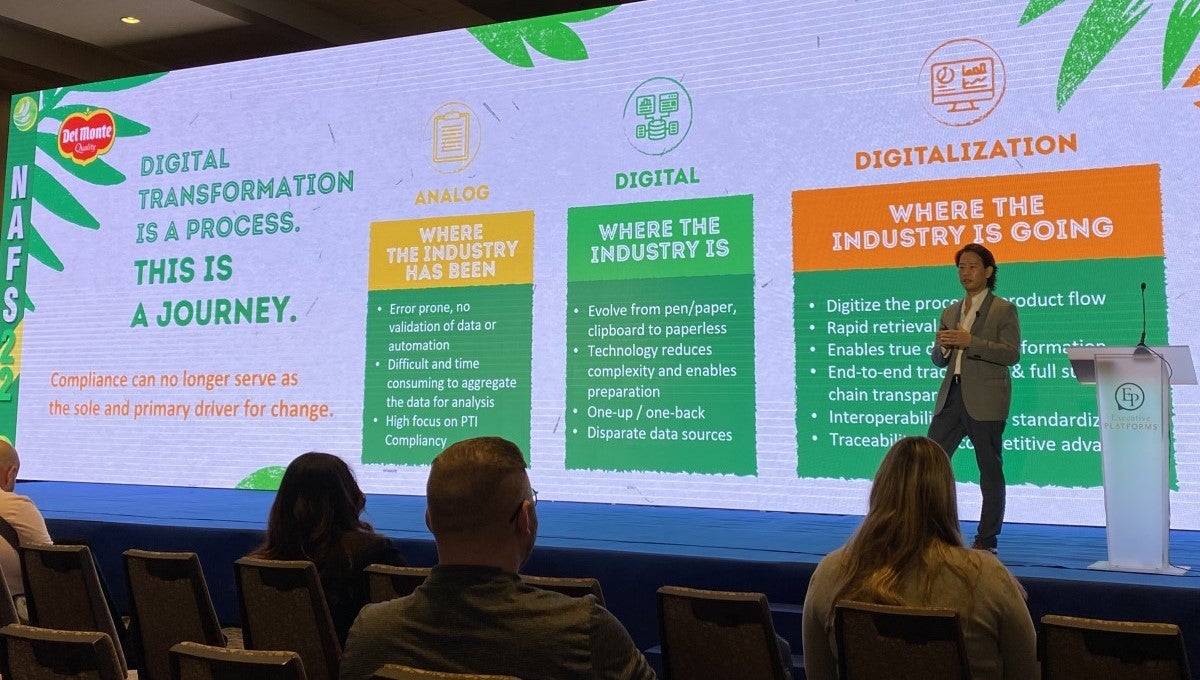

Now Available!
Get your copy of the 7th Annual State of Smart Manufacturing and hear from 300+ manufacturers in this new survey report!
Subscribe to Our Blog
For a monthly digest of expert insights, data points, and tips like the ones in this article.
North American Food Safety and Quality: Your NAFS22 Recap
Digital Transformation, Quality Management System (QMS)NAFS22 came packed with insights, ideas, and a shared call to action to achieve food safety and quality like we’ve never seen before. After days of conversations and presentations, the key question that remains is: how do we achieve this, particularly on a national and international scale?
Of the many topics discussed over the last several days, these are the ones that stood out most:
- Food safety and quality - to improve food safety and quality and all areas of the business and connecting that across the supply/value chains
- Digitization – changing from analog, paper-based process to digital
- Digitalization – using digital technologies to evolve the business
- Workforce and culture/change management to empower digitization
- Data and analytics – actionizing insights from digitization to connect people across the company
- Culture of quality – it’s not just the quality team but the entire organization that shares the responsibility of quality
- Sustainability across the enterprise
- Interoperability was the word of the week. This was a call for systematic digitization across organizations to gain visibility into value/supply chains to identify and amplify food safety and quality best practices.
Analog – Digital – Digitalization
Food and beverage manufacturing – and manufacturing in general – is continuing the process towards digitalization, but we’re not there yet and each organization is on their own path to achieving this. Let’s look at what each of these means as defined by Del Monte’s VP, Corporate R&D and Food Safety, Takashi Nakamura.
Analog is where the industry has been for years. This is the paper-based approach to systemizing processes. It’s error prone and lacks validation of data and automation of processes. As a result, it’s time consuming and extremely difficult to aggregate data for analysis. In the analog approach, there’s been a high focus on the Product Traceability Initiative to align the industry to systematically enhance supply chain traceability.
Digital is where the industry is currently, evolving to a paperless system where complexity is reduced by technology. The problem that we’re seeing here, though, is that in the pursuit of paperless, many companies are adopting multiple approaches/systems/software that are creating disparate data silos, impeding the access to information and open communication that they sought with a digital transformation.
Digitalization is where Nakamura, and many of the other speakers including ADM’s VP Global Quality and Food Safety, Lee Perry, see the industry going. This will bring digitized processes with automation and rapid access to interpreted real-time data, making communication across the organization faster, clearer, and more effective, elevating food safety and quality and the impact on the organization as a whole. End-to-end traceability throughout the supply chain – forward and backward – will enable rapid response when the need for a recall arises. Beyond this, many of the speakers focused on the importance of identifying problems before they happen.

FDA and Whole Genome Sequencing
Mark Moorman, Director of Food Safety at the FDA, spoke about the ability to run comprehensive root cause analysis to identify problems even before they spread. Through the root cause analysis process, organizations can identify problem areas that result in contamination, digging into how the contamination happened in the first place and assessing whether it can be prevented by a change in process, restructuring of operations, or another approach that will similarly help to achieve the goal of zero tolerance for outbreak.
The use of Whole Genome Sequencing to understand ecological associations with outbreaks can get us to informed prevention through the “how” and “why” of contamination and outbreak.
Section 204 of the FDA Food Safety Modernization Act (FSMA) also came up as a focus within many conversations and presentations throughout the conference. If you’re not familiar with Section 204, it “requires the FDA to designate foods for which additional recordkeeping requirements are appropriate and necessary to protect public health, and to establish those recordkeeping requirements.”
Building a Culture of Quality That Will Uncover the “How” and “Why”
Quality and food safety is an organization-wide responsibility. During the conference, I had many conversations that focused on the people behind the processes. You can have all the digitized operations in the world, but if you do not have the people to run those operations, or oversee the execution of those operations, what good are they?
Performing mock recalls with third parties and identifying different causes of potential outbreaks before they happen can guide measures that will address lingering problems. Using software, like a comprehensive cloud-based quality management system (QMS) that is tied-in across your organization – connecting with your MES and ERP systems, enhances tracking and traceability and can help predict problem areas within the organization’s processes. Among the many capabilities of Plex DemandCaster Supply Chain Planning, it helps bridge the gap between planning to production and enables interoperability by communicating with co-manufacturers to increase reliability with fewer inventory expirations. Applying the root cause analysis championed by the FDA with the help of software that enables digitalization of the organization can identify outbreaks before they happen.

